Editor’s note: I’d like to thank Cracked.com’s Rohan Ramakrishnan for his intensely mind-bending take on “The Shining” and also to Professor Suzanne Richardson at Utica College for allowing me to publish the movie/film theme analysis I wrote for her class, Written Communication II. I highly recommend Professor Richardson’s class – it was a truly enriching creative experience.
—
In life, in movies and in print, things are not always as they seem. Plot twists are part of the allure of cinematography and reading books. Unexpected revelations about characters add excitement and depth. Characters that are unassuming and innocent at first are often revealed to be the antagonist. This is a time-tested tool to strengthen works of suspense and horror.
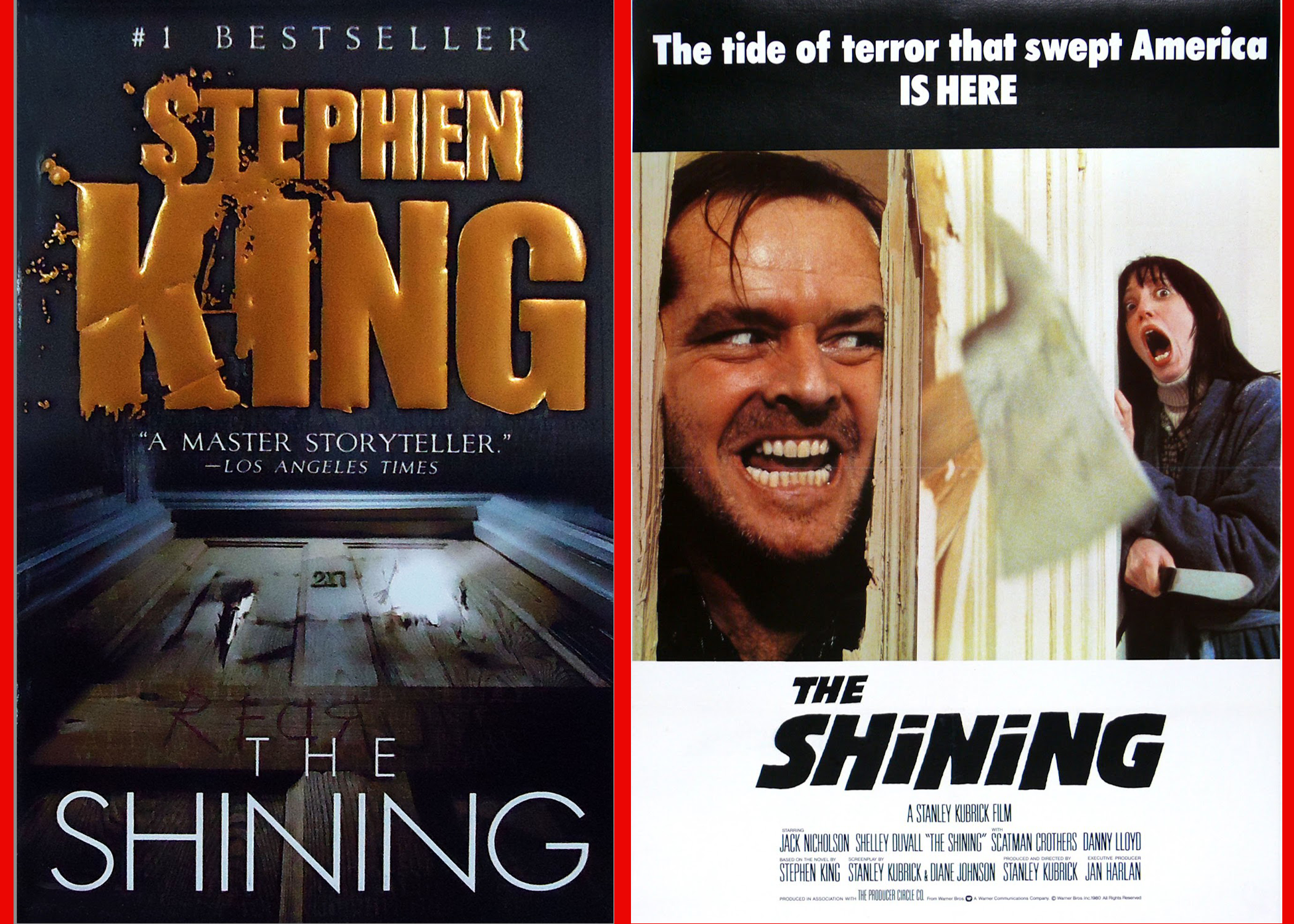
Stephen King and Stanley Kubrick’s interpretations of the text The Shining are a perfect example. Some theorize that Danny Torrance, Jack and Wendy’s 5-year-old son, is evil. Although Jack and the hotel are bad actors, so to speak, Danny controls the entire plot from start to finish. In an article published on Cracked.com, titled “A Theory That Will Change How You Watch ‘The Shining,’” film blogger Rohan Ramakrishnan argues that the movie holds hidden evidence that Danny is the true villain. He also states that his theory only applies to the movie. Upon close read, the book holds many indications that Danny is evil- even more so than the movie due to volume of textual evidence and the semi-omniscient viewpoint of the reader.
The smoking gun of the “Danny is evil” theme in The Shining is motive. Early in both works it is revealed that Jack Torrance is an abusive father, a raging alcoholic and has a temper. In the book, Jack breaks Danny’s arm upon discovering that he scattered his papers in his study. It is implied that other abuse occurred, as well. In a flashback when Wendy contemplates leaving Jack, King writes, “The handwriting on the wall was brutal but clear. Her husband was a lush. He had a bad temper, one he could no longer keep wholly under control now that he was drinking so heavily and his writing going so badly.”
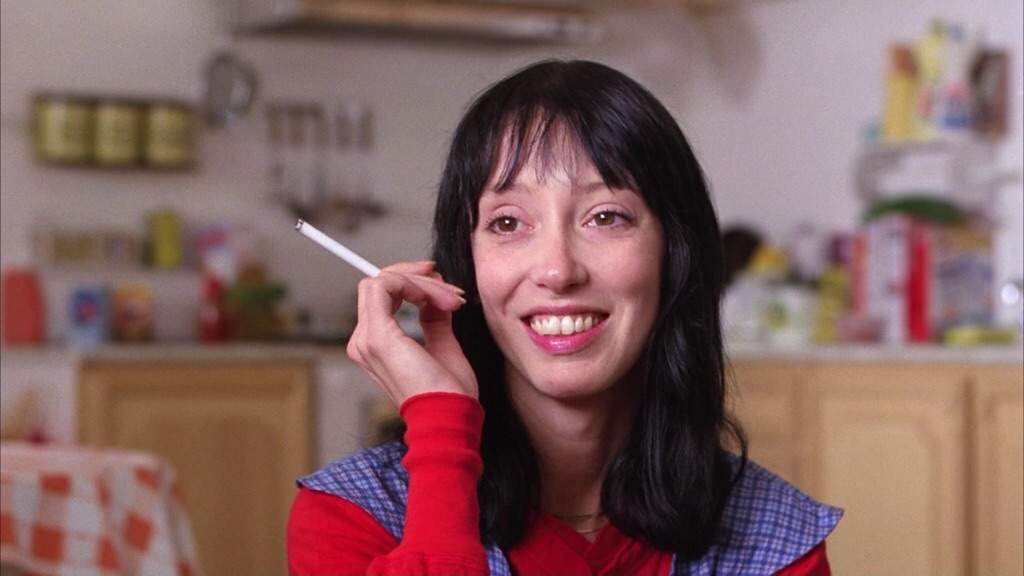
In the movie, Wendy, portrayed as a frail and shaky chainsmoker, explains to the doctor that Jack dislocated Danny’s shoulder in a similar incident, while downplaying the severity. This is a telling sign of an abused spouse, lying to cover up her husband’s actions even though she has been subject to the same abuse. If a dog is beaten and treated cruelly as a pup, it will grow to be vicious, and bite the hand of the master as well as others. This breed of nurtured evil is the root cause of Danny’s villainy in The Shining. It’s also his prime motive for revenge.
To compound the issue, Danny Torrance has a special gift, a psychic and telekinetic ability called “shining.” The extent of his power is revealed in the book when Danny first meets Dick Hallorann, the hotel cook, who shares the ability to shine. After a test of his power, Dick says that Danny has the “most powerful shine he has ever seen.”
Danny is capable of reaching into people’s minds, reading their thoughts and manipulating their realities in such a way that cause realistic and horrifying hallucinations. It is important to note that Danny’s true power is revealed only to Hallorann. The movie has less emphasis on Danny’s power, which is why the book supports the “Danny is evil” theme better. Kubrick portrays Danny’s power by showing him having fits and foaming at the mouth while others experience hallucinations such as the elevator gushing tides of blood. Danny also has premonitions of the future events via his imaginary friend, Tony.
Through no fault of his own, the combination of the abuse Danny suffered at a young age and possessing such great power shaped him into an evil child. It’s likely he grew to secretly despise Jack. He saw his father’s angry and often vulgar thoughts about his mother and himself. Danny began to spin a clandestine plot to seek vengeance upon his father. Enter the Overlook Hotel.
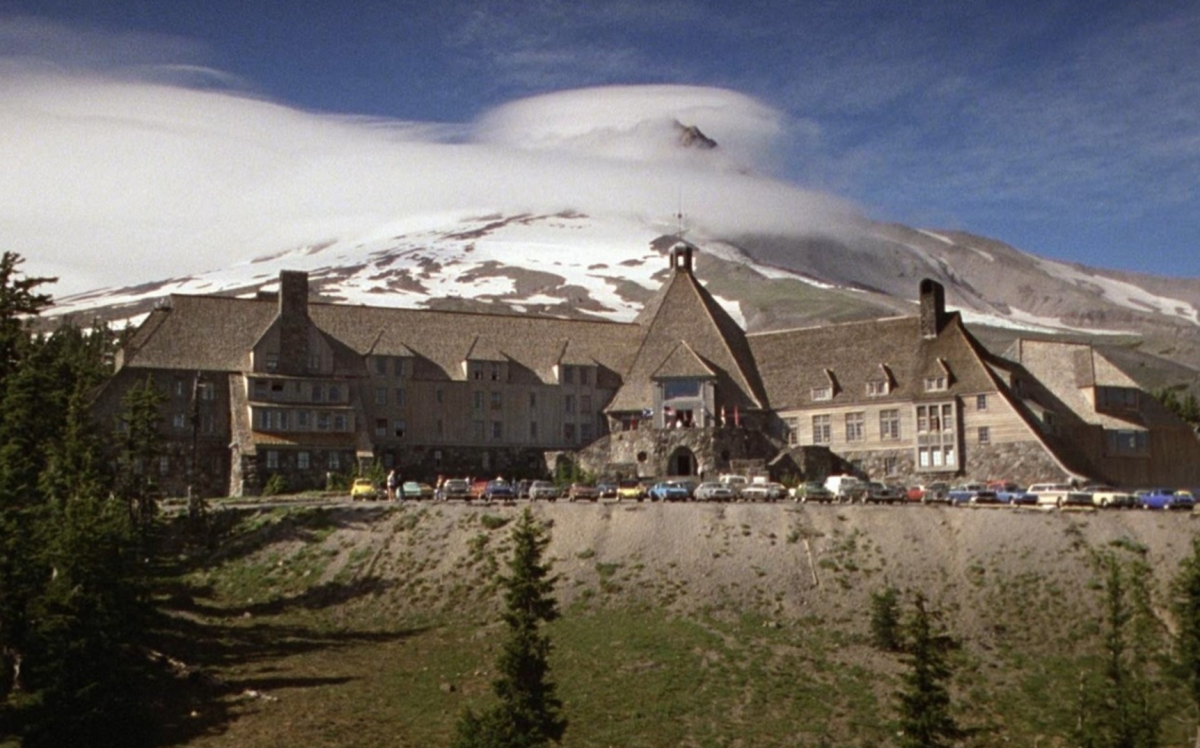
The book notes that Al Shockley, Jack’s drinking buddy and colleague, got Jack the job as winter caretaker at the Overlook Hotel. Al knows about the Overlook’s checkered past and has a high stake of ownership in the hotel. It could be that Danny, peering into Al’s mind as he often did with other characters in the book, saw The Overlook, and an opportunity. Danny saw his chance for revenge in a perfect isolated setting.
He could have implanted a mental suggestion for Al to give Jack the job at the Overlook. Jack, being unemployed and desperate, jumped at the opportunity. This would provide months of virtual solitude for Danny to torment his father with hallucinations or “hauntings,” and eventually kill him.
Evidence shows that the ghostly hauntings of The Overlook are hallucinations and nothing more. The topiary animals and dogman of the book are both visually disturbing, but never manage to cross the boundary from superficial fright to physical harm. The bark is worse than the bite. Documented in both the book and the movie, Hallorann talks to Danny about the hotel. Hallorann explains that what he sees at the Overlook are just pictures, and can’t actually harm him, which is repeated throughout the book. This is proven true, as no one at any point is physically harmed by any Overlook “ghost” or hallucinatory experience.
There is one possible exception. It focuses on the scene where Danny enters the room that Hallorann warns him about, Room 217/237. Jack, in the throes of a horrible nightmare, is awoken by Wendy, then Danny appears, sucking his thumb, and seeming distant. Danny has a large bruise on his neck.
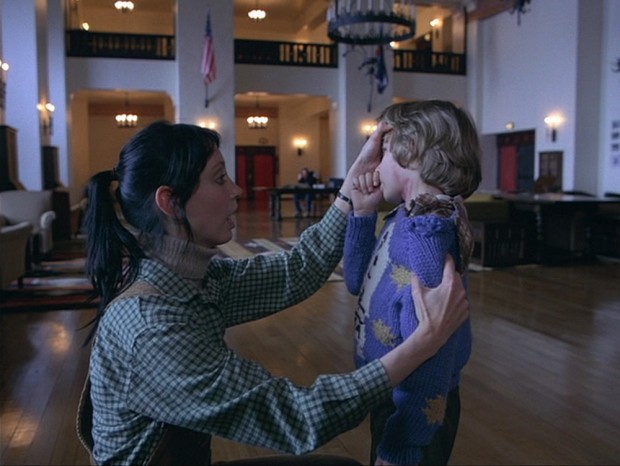
In the movie, Wendy immediately blames Jack saying, “You did this to him, you bastard!” The scene is similar in the book, but with an added nuance: Danny says, “It was her!” but doesn’t specify at the time who “her” is, making Jack believe that Danny is referring to Wendy. King gives the uncertainty breathing room by separating it into its own chapter, titled “It was her!”
On page 357, Jack says “Wendy, what did you do to him?” It’s not until the next chapter that Danny blames an apparition in room 217 for his bruises. It can be argued that Danny’s bruises were self-inflicted and part of his plan to cast a divide between Wendy and Jack.
On page 390 of the book, Jack and Wendy discuss the bruises on Danny. They talk about the stigmata phenomena, how the power of belief can be so strong that it causes self-harm. Jack says, “I can believe it’s possible, although it seems unlikely to me. What’s more likely is that he did it to himself.” A similar line is echoed in the movie.
At the conclusion of King’s chapter “WASP’S NEST,” Wendy realizes that things are amiss at the Overlook, and takes action to protect her son. She flees with Danny, driving down the mountain road precariously adjacent to a sheer cliff, towards Sidewinder, the nearest town. Wendy mills over an escape plan, which involves her and Danny living with her mother. Danny reads her mind and hates this plan. The car suddenly swerves over the yellow line. At the climax of the scene, Wendy says “Please, don’t do that.” This implies that Danny used his powers to pull the car as a warning to Wendy, and should be perceived as a malicious act. The reason why Danny doesn’t want to leave the Overlook to go with Wendy is simple: his plan to exact revenge upon his father would be ruined.
At mid-point in the book and the movie Jack hallucinates Lloyd the bartender, a lanky fellow in a tuxedo with slicked back hair and a ghostly pallor. Lloyd offers Jack drinks on the house, even though the Overlook’s bars are cleared of stock for the winter. Jack says “That’s swell. I like you, Lloyd. I always liked you. You were always the best of them.” He tells Lloyd he’s the “Best goddamned bartender from Timbuctoo to Portland Maine – or Portland Oregon for that matter.”
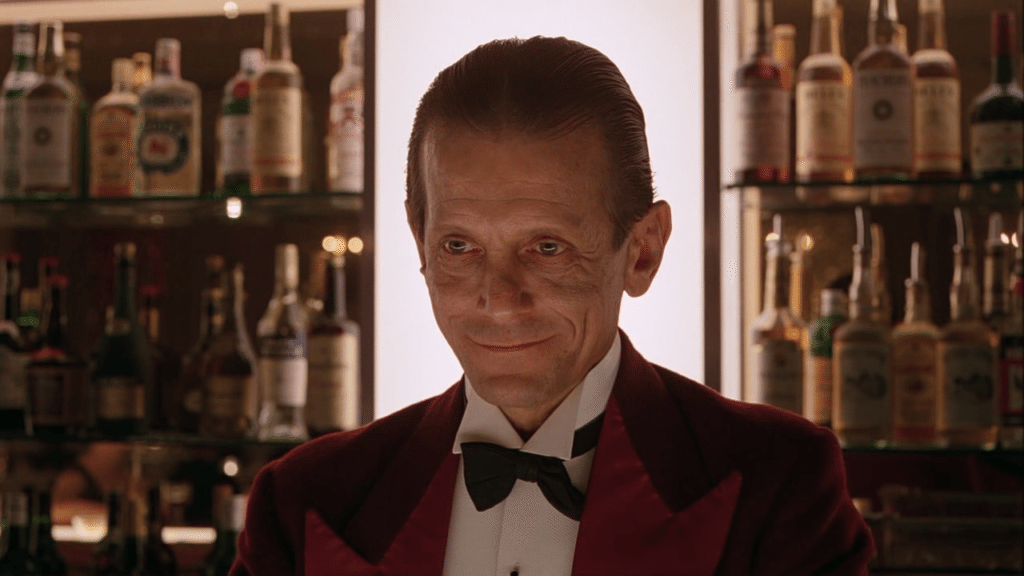
The word always and the locations are important, because it shows Jack knows Lloyd from his past, probably from his drinking days with Al Shockley. Someone is extracting this memory from Jack’s head and projecting it into the empty bar space of the gold room. Danny has the power to search through memories, so he is likely the projectionist behind Jack’s tormented hallucinations.
After Jack begins to “drink,” his murderous tendencies increase. The plot reaches a boiling point. On page 545 of the book, Jack catches Wendy by the ankle and proceeds to strangle the life out of her. It is a horrifically tense section to read. Danny doesn’t use his telekinetic power to thwart the attack. If he can yank a steering wheel with his mind then he could surely help out his mother in her moment of duress. Instead, he sits there acting helpless and perhaps even a little indifferent. Danny uses his shine to call out to Dick Hallorann, who is snow birding in Florida, and informs him of the situation at the Overlook. The signal is so powerful that it hurts Hallorann’s head. This occurs in both the book and the movie, but the book provides greater detail.
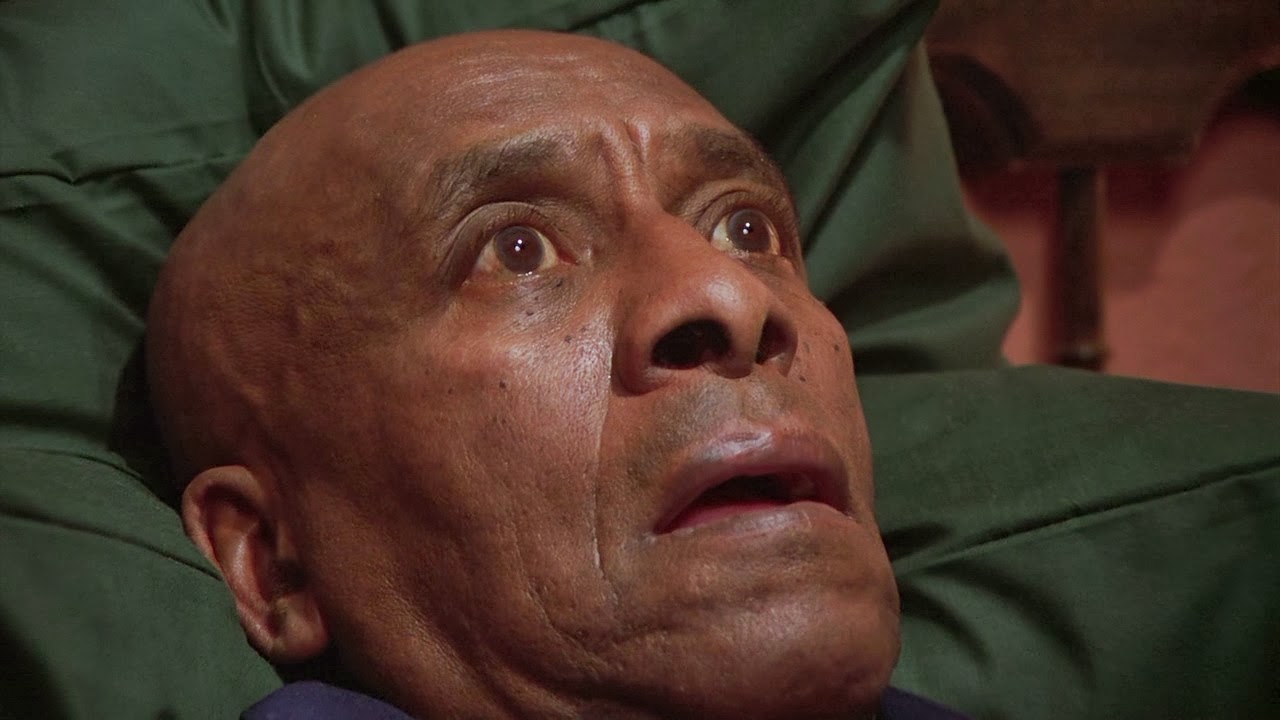
“It was as if someone shot (Hallorann) with a .45 caliber scream. (!!! OH DICK, OH PLEASE COME!!) The apparent reason for the call to Hallorann is for help. Alternately, it could be interpreted that Danny is luring Hallorann back to the hotel to tie up a single loose end. Hallorann knows how powerful Danny is and is the only person who does. Hallorann says “Naw, you got a flashlight, he the one with the searchlight.” He is the sole witness and a threat to Danny’s plan.
As Hallorann makes his obstacle-fraught journey back to the Overlook, he receives another “shine,” which is similar in strength to Danny’s message, but this time from a shadowy presence identified in the book as “The Manager.” It could be that Danny is playing a dual role here and actually is “The Manager” who contacts Hallorann.
On page 550, it’s noted that Danny’s shine and the hotel’s power are intimately connected: “It might even be that Danny’s shine was powering it, the way batteries power a car.” In the movie, when Hallorann arrives at the Overlook, Danny hides in a metal cabinet in the kitchen while Jack jumps out and kills Hallorann with one fell swoop of his axe. Similarly, in the book, Jack mortally wounds Hallorann while Danny stays out of sight.
It is only when Hallorann is dead that Danny screams and makes a break for it. Danny could have warned Hallorann, but instead, he intentionally remained hidden and silent. In the movie, this represents Danny tying up his loose end. Now, the only thing left to do is to finish off Jack. Danny does so by running outside into the blizzard. He lures Jack into the hedge maze; a labyrinth that Danny knows how to navigate well, but Jack does not. Danny cleverly backtracks his steps, escapes the maze, and seals his father’s fate as a human freeze pop. This is where the movie leaves off, but the book offers more hints of Danny’s evil in its conclusion.
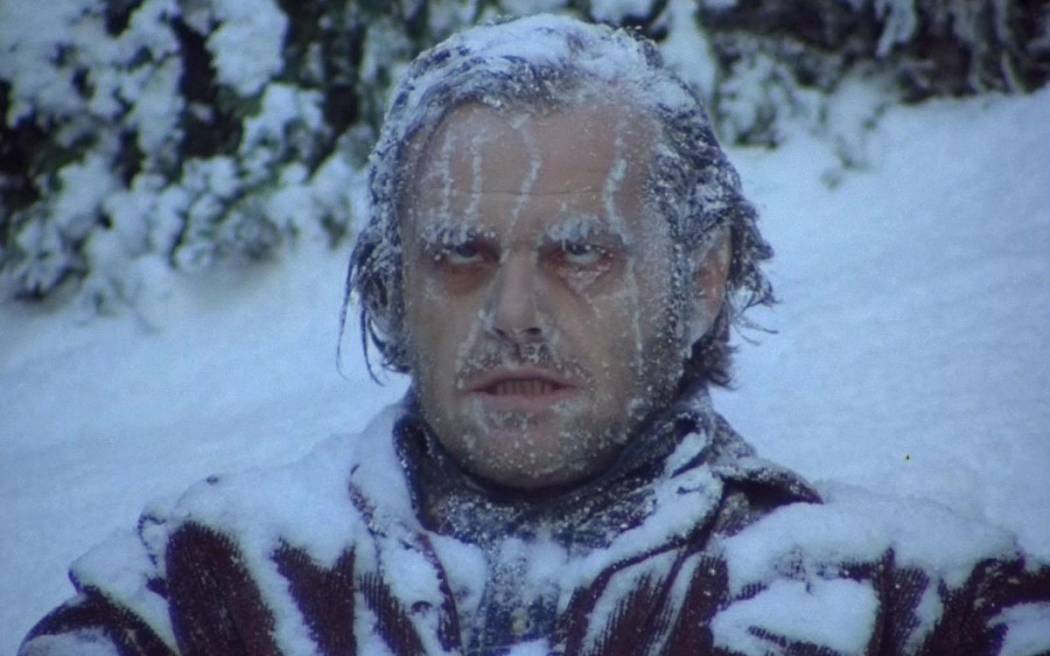
The book ends with Jack failing to kill anyone, smashing off his own face with a croquet mallet, then the hotel explodes, killing him. Danny, Wendy and Hallorann escape. “They’re dead! They’re all dead! Danny screamed in hysterical triumph.” The wording implies that Danny was feeling victorious, and doesn’t seem at all concerned that his father was just incinerated or that his mother is badly injured. Hysterical triumph is a phrase best suited to describe someone who has accomplished a difficult mission, one that took months, if not years to plan and execute.
The only person who isn’t severely injured by the end of the book is Danny. He is, for the most part, unscathed. In fact, the only real injury he incurred the whole time was the bruising on his neck, which was probably self-inflicted. By all accounts, he is the only one in the book that wasn’t stabbed, beaten or badly injured by Jack.
Hallorann says “sometimes it feels like only the bad people stay healthy and prosper,” which implies that Danny is among the ranks of bad people. The book ends in a sickly-sweet happily ever after chapter. Wendy, Danny and Hallorann are all at a resort in Maine. Danny is fishing, and the sun is setting.
Things are not always as they seem in horror and suspense and the ending of the book should be viewed under this lens. The chapter has sinister undertones and may be King’s way of pointing to Danny’s true nature. In the last paragraph, Danny and Hallorann are talking by the lake and Danny hooks a fish.
“He (Hallorann) put an arm around Danny’s shoulder and the boy reeled the fish in, little by little.” The fish could be a metaphor for Hallorann buying Danny’s innocence hook-line-and-sinker. Wendy receives a life insurance claim for Jack’s death, which adds another motive for Danny killing his father. Danny mentions visiting Hallorann next summer. Time to tie up that pesky loose end. Camping, anyone?
Be it text or film, if read closely, Danny is the antagonist in The Shining. He is the source of contention between Wendy and Jack; as well as between the hotel “manager” and Jack, the cause for Hallorann’s abrupt death in the movie and serious injury in the book. All the while, Danny avoids any serious injury, and seems to go into fits in the movie when the hallucinations occur. As Ramakrishnan points out in his Cracked.com article, this could be interpreted face value as Danny being afraid, but a closer look reveals that he may actually be concentrating extremely hard to create the frightening hallucinations experienced by the Torrance family.
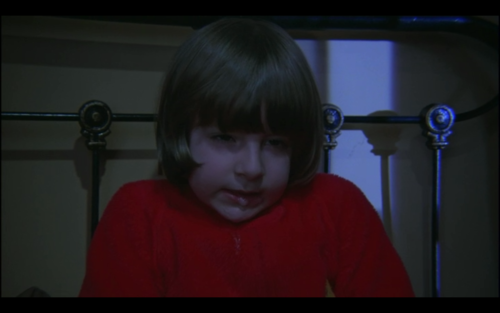
As soon as one starts to read in the context of Danny being evil, the whole plot of The Shining makes much more sense. Supernatural evil doesn’t exist, but evil produced by abuse and excessive power is very real, tangible and unfortunate. Stephen King admits that The Shining is supposed to question the notion of supernatural evil versus human evil.
Cleverly, Jack is the person who most would identify as the evil one and they aren’t completely wrong. The subtext of the book and movie both point strongly to the fact that Danny – helpless, innocent Danny – is truly the most evil character in the text.


















![President Todd Pfannestiel poses with Jeremy Thurston chairperson Board of Trustees [left] and former chairperson Robert Brvenik [right] after accepting the university's institutional charter.](https://uticatangerine.com/wp-content/uploads/2023/10/unnamed.jpeg)


















































































































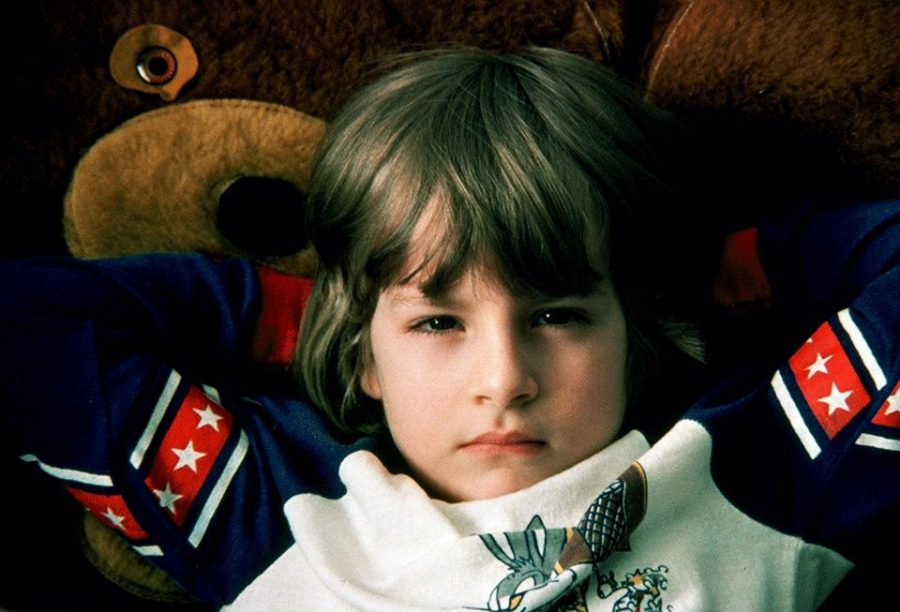



Kai Ruiz • Nov 8, 2021 at 9:02 am
This article seems well done and interesting enough but… I don’t see how all this could play out with the sequel to The Shining, Doctor Sleep, in either the books and the movie in which I’ve both read and seen. But thank you for for writing this, it was interesting to see another perspective, even though I’m not quite convinced.
Todd Sleezer • May 8, 2020 at 7:19 pm
Interesting theory to read about… as I sot and watch the Kubrick Cut.
I still don’t buy Danny as any kind of purposeful or malevolent anagonist… but by happenstance? In a round about way?
Yeah, I can get behind this theory. Either way, well thought out. Good on whomever originally wrote the article.